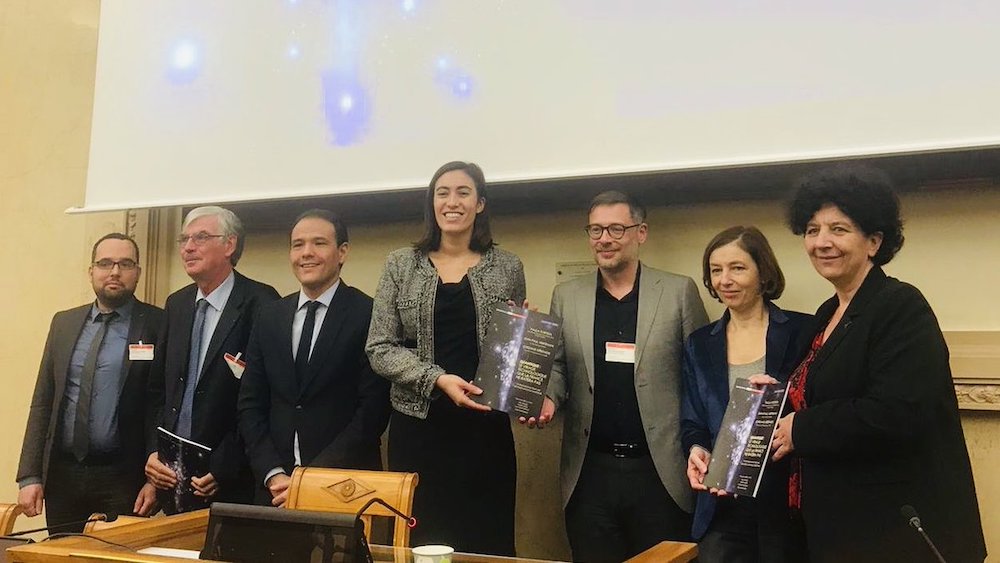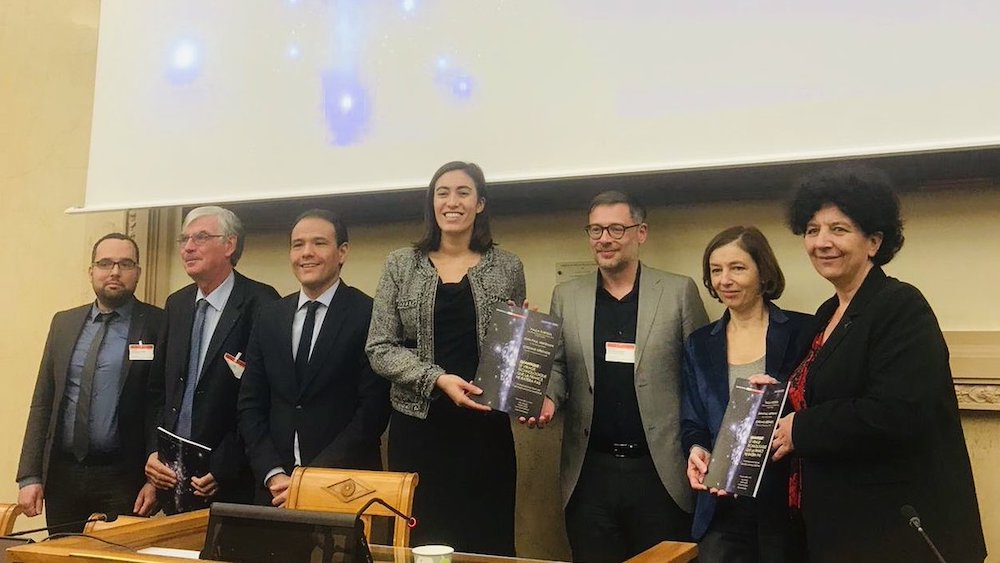
Photo Cédric O (via Twitter)
Florence Parly, Minister of the Armed Forces, Bruno Le Maire, Minister of the Economy and Finance, Frédérique Vidal, Minister of Higher Education, Research and Innovation, and Cédric O, Secretary of State for Digital Affairs, were today presented with the conclusions of the Quantum Report: the technological shift that France will not miss, written by Paula Forteza, LREM deputy for French people abroad (2nd constituency), Jean-Paul Herteman, honorary president of GIFAS and former chairman and CEO of Safran, and Iordanis Kerenidis, director of research at the CNRS.
This announcement was part of the mandate given to them by the Ministers to propose a national strategy for quantum technologies based on an ecosystem assessment and preliminary recommendations.
In view of the economic growth and sovereignty issues related to quantum technologies, the European and global context in which some countries are stepping up their development programs around these technologies, and the strengths and weaknesses of the French industrial and research ecosystem, the report makes six strategic recommendations:
Deploy a state-of-the-art quantum computing infrastructure for research and industry
“The establishment, on French soil, of a world-class infrastructure, integrating various emulators and quantum accelerators based on various technological principles, could represent a strong lever for action. It will make it possible to limit the risks of lock-in and vertical integration effects, develop the software ecosystem and practical uses, enhance France's legitimacy and influence internationally and contribute to the emergence of world-class French and European quantum computer suppliers.
Closer ties with European partners, particularly Germany, could make it possible to develop a common offer and portal, aimed at providing access to all European quantum computing technologies.”
This seems obvious, and moreover, several private players such as IBM or Atos did not wait for the parliamentary report to set up this type of initiative.
Launching an ambitious technological development program
“With research and technological development program that bring together public and private players by combining bottom-up and top-down approaches, France will be able to provide itself with the resources needed to overcome the various scientific and technological obstacles to the development of the quantum computer, as well as the cryptographic devices needed to secure sensitive communications in the quantum age.”
The question of sovereignty is a key issue. Will France seek to be sovereign in quantum computing? If so, does it have the financial means to do so? If not, with which partners will it share the achievement of this sovereignty?
Setting up a support program for the development of uses of quantum computers.
“Quantum challenges’ associating sectors of use and technology sectors, both in the field of quantum computing and in the field of quantum sensors, would make it possible to strengthen the competitiveness of downstream sectors while securing the short-term outlets of technology sectors.”
We are talking here about the famous "hackathons", which allow teams to work together on specific subjects. But these "hackathons" are frequently criticized by start-ups, who accuse large companies of taking advantage of these events to speed up their own research and take free credit for ideas developed by others.
Creating an effective innovation environment
“The creation of quantum centers based on research and development centers that are internationally recognized for their academic and industrial influence would be a key lever for interdisciplinary mixing, creating cohesion and freeing up the informal time needed to remove the obstacles preventing the implementation of a national strategy. The development of skills and access to quality risk capital will make it possible to remove the obstacles to innovation and the creation of startups, an essential vector for the transfer of technology to the economic fabric.”
Deploy an appropriate economic security strategy
“France's position on quantum technologies encourages certain organizations or States to take an interest in the French ecosystem and to target the most vulnerable players, who are at the forefront of the world. The protection of scientific and technological heritage and economic diplomacy will be the pillars of an effective economic intelligence strategy.”
France produces the best engineers in the world. Americans often say so. But very often they join large foreign companies, which give them more resources and a better working environment. France must do everything possible to retain its scientists. The report asks the question: should we motivate them to stay, or should we regulate attempts to buy out or recruit from other countries? Does regulation have a chance of working in this area?
Establishing effective governance
“Given the high level of uncertainty regarding certain paths of development of quantum technologies, the longtime horizons of the actions to be carried out and the capital intensity required, the State will need agile governance with decision-making power, involving the State, research organizations and industrialists.”
On this occasion, the ministers announced the creation of a working group made up of representatives of the State and its research operators (CEA, INRIA and CNRS) and financiers (BPI, SGPI). It will be responsible for drawing up the multi-year research programming law, a detailed roadmap for responding to the report's six recommendations. This detailed road map, expected for the first quarter of 2020, will specify the five-year work program of each ministry and operator, as well as the state, private and community sources of funding for the quantum plan. It will therefore be several more months before France announces a concrete action plan. The details of its financing are still unknown.
This announcement was part of the mandate given to them by the Ministers to propose a national strategy for quantum technologies based on an ecosystem assessment and preliminary recommendations.
In view of the economic growth and sovereignty issues related to quantum technologies, the European and global context in which some countries are stepping up their development programs around these technologies, and the strengths and weaknesses of the French industrial and research ecosystem, the report makes six strategic recommendations:
Deploy a state-of-the-art quantum computing infrastructure for research and industry
“The establishment, on French soil, of a world-class infrastructure, integrating various emulators and quantum accelerators based on various technological principles, could represent a strong lever for action. It will make it possible to limit the risks of lock-in and vertical integration effects, develop the software ecosystem and practical uses, enhance France's legitimacy and influence internationally and contribute to the emergence of world-class French and European quantum computer suppliers.
Closer ties with European partners, particularly Germany, could make it possible to develop a common offer and portal, aimed at providing access to all European quantum computing technologies.”
This seems obvious, and moreover, several private players such as IBM or Atos did not wait for the parliamentary report to set up this type of initiative.
Launching an ambitious technological development program
“With research and technological development program that bring together public and private players by combining bottom-up and top-down approaches, France will be able to provide itself with the resources needed to overcome the various scientific and technological obstacles to the development of the quantum computer, as well as the cryptographic devices needed to secure sensitive communications in the quantum age.”
The question of sovereignty is a key issue. Will France seek to be sovereign in quantum computing? If so, does it have the financial means to do so? If not, with which partners will it share the achievement of this sovereignty?
Setting up a support program for the development of uses of quantum computers.
“Quantum challenges’ associating sectors of use and technology sectors, both in the field of quantum computing and in the field of quantum sensors, would make it possible to strengthen the competitiveness of downstream sectors while securing the short-term outlets of technology sectors.”
We are talking here about the famous "hackathons", which allow teams to work together on specific subjects. But these "hackathons" are frequently criticized by start-ups, who accuse large companies of taking advantage of these events to speed up their own research and take free credit for ideas developed by others.
Creating an effective innovation environment
“The creation of quantum centers based on research and development centers that are internationally recognized for their academic and industrial influence would be a key lever for interdisciplinary mixing, creating cohesion and freeing up the informal time needed to remove the obstacles preventing the implementation of a national strategy. The development of skills and access to quality risk capital will make it possible to remove the obstacles to innovation and the creation of startups, an essential vector for the transfer of technology to the economic fabric.”
Deploy an appropriate economic security strategy
“France's position on quantum technologies encourages certain organizations or States to take an interest in the French ecosystem and to target the most vulnerable players, who are at the forefront of the world. The protection of scientific and technological heritage and economic diplomacy will be the pillars of an effective economic intelligence strategy.”
France produces the best engineers in the world. Americans often say so. But very often they join large foreign companies, which give them more resources and a better working environment. France must do everything possible to retain its scientists. The report asks the question: should we motivate them to stay, or should we regulate attempts to buy out or recruit from other countries? Does regulation have a chance of working in this area?
Establishing effective governance
“Given the high level of uncertainty regarding certain paths of development of quantum technologies, the longtime horizons of the actions to be carried out and the capital intensity required, the State will need agile governance with decision-making power, involving the State, research organizations and industrialists.”
On this occasion, the ministers announced the creation of a working group made up of representatives of the State and its research operators (CEA, INRIA and CNRS) and financiers (BPI, SGPI). It will be responsible for drawing up the multi-year research programming law, a detailed roadmap for responding to the report's six recommendations. This detailed road map, expected for the first quarter of 2020, will specify the five-year work program of each ministry and operator, as well as the state, private and community sources of funding for the quantum plan. It will therefore be several more months before France announces a concrete action plan. The details of its financing are still unknown.








 The French startup ColibriTD has raised €1 million in funding from the Earlybird fund to make quantum computing universally accessible
The French startup ColibriTD has raised €1 million in funding from the Earlybird fund to make quantum computing universally accessible